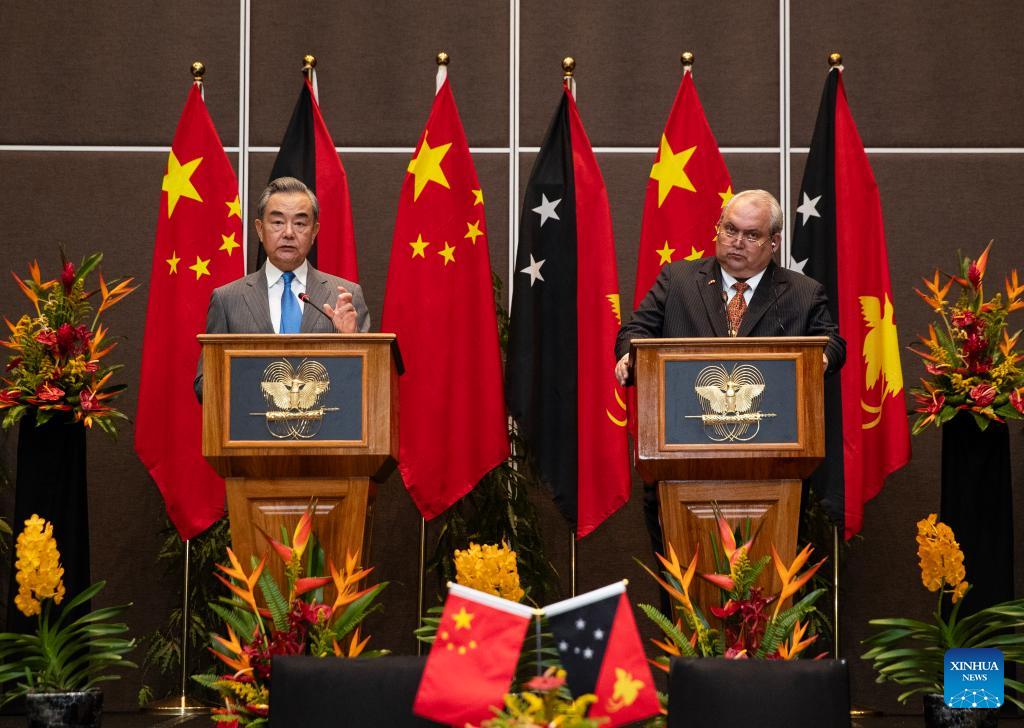
Chinese Foreign Minister Wang Yi, also a member of the Political Bureau of the Communist Party of China Central Committee, and Papua New Guinea's Foreign Minister Justin Tkatchenko attend a joint press conference after their talks in Port Moresby, Papua New Guinea, April 20, 2024. [Photo by Ma Ping/Xinhua]
PORT MORESBY, April 20 (Xinhua) -- Chinese Foreign Minister Wang Yi said on Saturday that he had in-depth and friendly talks with his Papua New Guinea (PNG)'s counterpart Justin Tkachenko with broad consensus reached on bilateral ties.
Wang, also a member of the Political Bureau of the Communist Party of China Central Committee, made the remarks at a joint press conference with Tkachenko following a meeting between the two ministers.
Wang and Tkachenko unanimously believed that China and PNG should continue mutual trust and support, and unswervingly maintain and develop the comprehensive strategic partnership between the two countries.
Wang noted that since the establishment of China-PNG diplomatic relations, China has always regarded PNG as a significant partner and close friend, viewed the bilateral ties from a strategic perspective and enhanced the exchanges between the two countries on equal footing.
China firmly supports PNG in safeguarding its sovereignty and territorial integrity, as well as adopting a successful development path that suits the country's national conditions, said Wang, also appreciating PNG's adherence to the one-China principle, and backing to China's core interests and major concerns.
Wang and Tkachenko unanimously agreed to constantly focus on development, pay heed to people's welfare, and promote mutually beneficial cooperation in all spheres.
Wang said that PNG was the first Pacific island country to sign the memorandum of understanding and cooperation plan on Belt and Road cooperation, and has become China's largest trading partner, investment destination and project contracting market in the region. With the joint efforts of both sides, important progress has been achieved in implementing the outcomes of Prime Minister James Marape's visit to China in October last year.
In key areas, such as disaster prevention and mitigation, information and communications, agricultural products trade, and energy, the two sides are determined to push for practical cooperation with higher quality, faster speed and better results, said Wang.
Speaking of the recent flood disasters in PNG, Wang expressed empathy for the situation, saying that China has extended emergency humanitarian aid to PNG and will send a batch of relief supplies next week.
Wang and Tkachenko also unanimously advocated that the domestic affairs of Pacific island countries should not be interfere, their right to independent development should not be denied, and the environment of peace and stability must be secured.
The Chinese foreign minister underlined that Pacific island countries have the right to pursue friendly cooperation with all development partners. China and the Pacific island countries are members of the Global South and also developing nations. It is right and proper for the two sides to help each other and deepen South-South cooperation.
China regards Pacific island countries as indispensable partners in building a community with a shared future for mankind and has always upheld the "four full respects" policy for their sovereignty and independence, will, cultural traditions and efforts to seek strength through unity when forging ties with Pacific island countries. China has provided assistance to Pacific island countries with no political strings attached or impositions, and the aid has never come as lip-service, said Wang.
The Chinese foreign minister called on the international community to pay more attention to the specific situations and legitimate concerns of the Pacific island countries, focus on issues of their greatest concern, such as climate change and improvement of people's livelihoods, and contribute solid solutions and actions for their good.
Wang stressed that non-intervention in the domestic affairs of other countries is a basic norm of international relations established by the United Nations Charter and a guarantee for the survival of developing countries.
As the Solomon Islands is holding a general election, Wang expressed wish for a smooth and safe process there, saying that all parties should respect the choice of the people of the Solomon Islands and refrain from interfering in their domestic affairs.
The people of Solomon Islands have the wisdom and ability to decide the future of their country, said Wang.

 中文
中文



